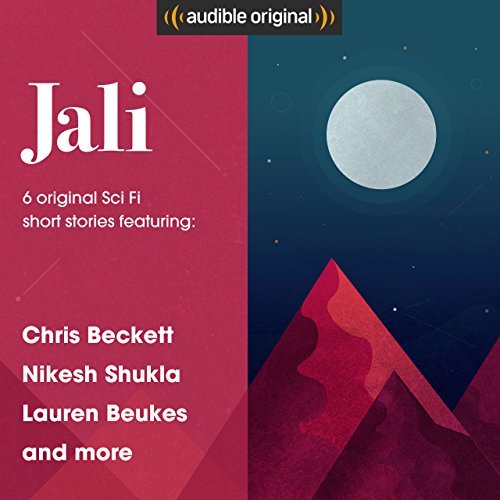George Hrab has recorded an audio version of my story ‘The Peacock Cloak’ (a particular favourite of mine), here on Starship Sofa.
Category: Listenable stuff
Podcast discussions of Dark Eden (and an interview)

Spectology have recorded not one but two very detailed discussions of Dark Eden. The ‘pre-read’ discussion is here. The ‘post-read’ discussion (i.e. the one in which spoilers are allowed) is here. They like the book a lot, which I’m obviously delighted about.
Following these two podcasts, Adrian from Spectology did an additional podcast in the form of an interview with me, which you can find here.
Jali
 I’m very pleased to be part of this original audio collection of six SF stories, which have just been published by Audible. Most of my books, including my latest short story collection Spring Tide, are available as audio books, but this is the first time that I’ve had a story whose first appearance was in audio format.
I’m very pleased to be part of this original audio collection of six SF stories, which have just been published by Audible. Most of my books, including my latest short story collection Spring Tide, are available as audio books, but this is the first time that I’ve had a story whose first appearance was in audio format.
My story is called ‘When Will We Get There?’ (the title being a deliberate homage to one of my very favourite stories, Philip K. Dick’s ‘I Hope I Shall Arrive Soon’), and it is beautifully read by Clare Corbett.
The other five stories in the collection are by An Owomoyela, Nikesh Shukla, Lauren Beukes, Ken Liu and Paul Cornell, so I’m in distinguished company.
Les Indes Galantes
Possibly the most cheerful piece of music I know of. You definitely need to watch this until the two soloists do their chicken dance.
Che Puro Ciel
A bit random, but it’s something I’ve just been listening to and I thought I’d share it. This lovely aria is from Gluck’s Orfeo ed Euridice.
Orpheus is a poet and musician whose music is so beautiful that even stones are enchanted by it. When his beloved Eurydice is killed by snakes, he travels to the underworld to try and win her back. Even the hearts of the rulers of the underworld are softened by his sweet music, and they agree she can return to life on the one condition that he doesn’t look at her, even once, until they have emerged again into the world of the living.
In this aria, after various travails, Orpheus finds himself in the Elysian fields. ‘How pure the sky,’ he sings, ‘how bright the sun…’ But none of this can make him happy until he has Eurydice back again. At the very end of the aria, the chorus announces the arrival of Eurydice. Heart-stopping moment! To be in her presence again, when he thought he’d lost her forever and yet be forbidden to look at her, or even to explain to her why he must constantly turn away his face.
It fascinates me the way old stories from different places tend to echo one other. No doubt this is sometimes because a story from one culture is heard and taken up by people from another, like the story of St Josaphat. But I’m sure it also happens because certain stories reflect deep structures in the human mind which are universal, and perhaps even hardwired into our brains.
I think of the biblical story of Lot’s Wife, who would be turned to a pillar of salt if she looked back at the city of Sodom. But a much stronger resonance is with the Norse story of Balder, who like Orpheus was capable of stirring the hearts even of animals and stones.
In the Balder story it is Balder himself who dies and his mother who sends a messenger down into the underworld to beg for his return. As in the Greek story, the ruler of the underworld grants the request on one condition (albeit a different one), and as in the Greek story (though not in the opera!), the condition is almost met but not quite, and the beloved one is lost forever.
Time for Cakes and Ale: Podcast Interview
Here’s a podcast interview with me, by ‘Time for Cakes and Ale’ run by Becks and Eeson. They describe their podcast as ‘an outlet for our ramblings on whatever geeky topics take our fancy’. I like a bit of rambling myself, and here they have indulged me at length. Thanks both.
The fire from the skies
When I was a kid at school in the 70s a lot of the music we listened to was blues-based stuff and prog rock. I don’t listen to much of that now -the music from then that stands the test of time for me is from quite different genres- but here is a little prog rock classic that still works for me: the extended piece by Genesis called Supper’s Ready. I specially love the section that breaks out at about 15:30 in a burst of sheer exultant energy, with imagery straight from the Book of Revelations:
With the guards of Magog, swarming around
The Pied Piper takes his children underground
Dragon’s coming out of the sea
Shimmering silver head of wisdom looking at me
He brings down the fire from the skies
You can tell he’s doing well by the look in human eyes
Better not compromise, it won’t be easy
666 is no longer alone
He’s getting out the marrow in your backbone
And the seven trumpets blowing sweet rock and roll
Gonna blow right down inside your soul
Pythagoras with the looking glass reflects the full moon
In blood, he’s writing the lyrics of a brand-new tune
Why is it that the destruction of everything we know can be such an exhilarating idea? Is too fanciful of me to say that being human is only one thin layer of what we are, and that (as the Jeff folk put it in Eden) before anything else, we are simply the world looking out at itself? From that perspective, after all, nothing can ever be finally destroyed, only thrown in the fire to be cast anew.
Angie Redlantern speaks
Daughter of Eden is now out as an audiobook from Audible. It’s read by Imogen Church and, listening to the sample, I think she’s done a really wonderful job of it. I felt I was listening to Angie Redlantern herself telling the story. Which was a strange and rather moving experience, given that Angie (possibly my favourite Eden character) came out of my own head. Click on this link for the free sample and judge for yourself.
Problematic (Words I don’t like #1)
A Canadian student group apologises for including he Lou Reed song Walk on the Wild Side in a playlist, on the basis that the lyrics of the song are transphobic and therefore ‘problematic’. Transphobia seems a pretty weird charge to lay against this particular song -a song which actually celebrates a transexual character in its opening verse- but let’s leave that aside. What I find actually creepiest about this story is the use of the word ‘problematic’.
To be clear about this, I don’t mind people strongly objecting to what other people say. ‘I find X’s views utterly obnoxious’, is fine. So is ‘X’s views are racist” (and indeed so is ‘ X’s views are transphobic’, whether or not it happens to be a reasonable charge in this particular case). But ‘X’s views are problematic’, which in a way sounds more polite, less confrontational, I find quite nauseating.
I’m trying to figure out why. I think in part it’s the very politeness that I object to, the tight, anal, priggish, self-control that is implied. But I think perhaps also it’s the implication that there exists a single correct account of the world, which the speaker possesses and others do not.
Not so pretty things
My son was playing old David Bowie tracks recently and one of them was ‘Oh You Pretty Things,’ from Hunky Dory, an album which I adored and must have listened to thousands of times in my teens. ‘Pretty Things’ is a paeon to a new generation shouldering aside a stale old one:
Look at your children
See their faces in golden rays
Don’t kid yourself they belong to you
They’re the start of a coming race…
You gotta make way for the homo superior
It was a common theme in the late 60s and 70s. See Joni Mitchell’s lovely ‘Woodstock,’ for instance, or Jefferson Airplane’s ‘Volunteers’ (‘…One generation got old/One generation got soul…’) But as I listened to it, it struck me with a mixture of sadness and wry amusement that the generation Bowie was thinking of were the Baby Boomers, the very people, now at the threshold of old age, who many in a new generation are blaming for the current dire state of the world.
